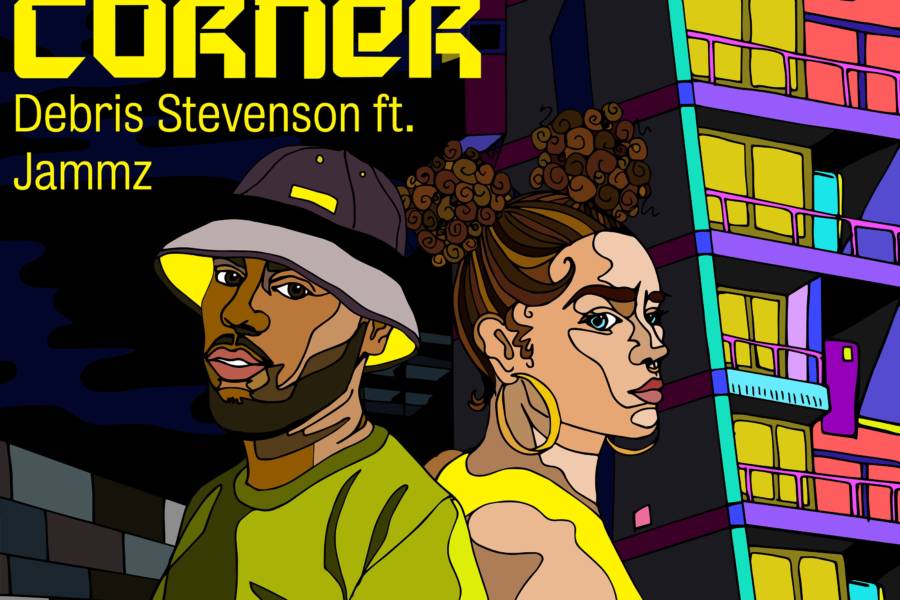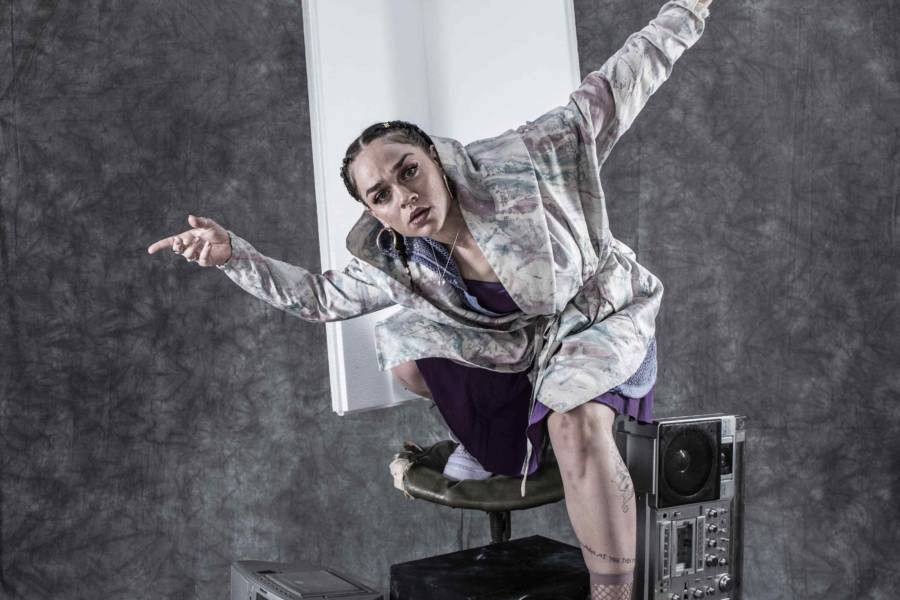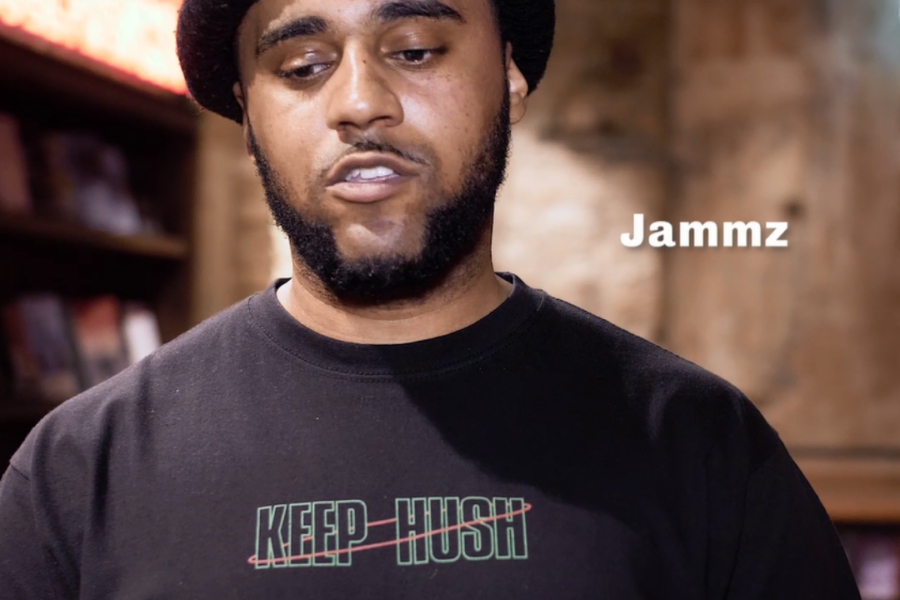Poet in da Corner: Music, movement, and (re)making theatre traditions
Published on Fri 14 Feb 2020In the first of a series of blogs with Debris Stevenson and Jammz, the Poet in da Corner writers and performers, we discuss dance and movement from the show, creating the album, and how this grime musical breaks theatre tradition.
Poet in da Corner plays and breaks with the traditions and conventions of theatre. How do you think it does that and where does it do that?
Jammz: I’m very passionate about grime and the genre of music that I make, so to be able to do that in theatre, in a space like this where it doesn’t live, is one of the biggest traditions that you can break. Sometimes when we do the play, I feel like a lot of people come to the theatre and they feel like they can’t stand up, they can’t make noise. But, in this play, I very much love it when people laugh out loud and have some kind of connection to it. Even at the end, when I tell everybody to stand up, a lot of people are still kind of confused as to whether they actually can. I feel like Poet in da Corner has broken theatre traditions and also in terms of getting people that look like myself into a theatre. Me and my mates would never link up on a Friday and say “Yo, let’s go to the theatre, but why not?” The theatre is for everybody and I feel like Poet in da Corner is actively encouraging new people to come here and create an experience.
Debris: I didn’t grow up going to the theatre. So, really my first introduction to theatre was through Mouthy Poets, the company that I started. We were based in a theatre, so that was sort of how I got introduced to it. If you’ve seen Poet in da Corner, you’ll know my life was pretty weird, right? Even being a dyslexic poet or whatever, it feels like going A to B hasn’t always made sense to me. I’ve had to take the scenic route. So, for me, I’ve always had to have tradition explained to me as it’s never been something I’ve understood. So, I think, when it came to theatre, I didn’t even know what the traditions were to be honest. I really didn’t know. I knew that I loved the Royal Court. I knew that the Royal Court was gassed. When I did my MA they were like “You get in with the Royal Court? You’re sick bruv.” Well, that’s not how they said it, that’s how I say it! So I knew it was big when I came to the Royal Court, largely because of the poet, Lemn Sissay was like “yeah, do that.” and I trust him.
It’s like what Jammz said, I’d say to my friends “Let’s go to the theatre” and they’d be like, “What’s wrong with you?” I think people talk a lot about barriers to theatre, and what they don’t talk about is boredom. There’s this thing in England, where it’s like if something is clever, it has to be boring. People don’t always appreciate that this show took five years to write, like, I think we’re on draft 20-something. The amount of skill that’s going into what we’re doing, just because I want to make you laugh at the same time doesn’t mean it’s reducing its quality. So, I’m just always trying to make things fun. I’m just trying to bring people together that wouldn’t usually sit next to each other. I’m trying to bring experiences together and trying to remake tradition, just be human and create connections. I’ve had to relearn about other people perpetually throughout my life and I want to enable that for other people.
J: Just to add to that, that’s the beauty of what this play does for me. A lot of people look at the kind of music I make, that aren’t from where I’m from, and they have this perception but then you come here to the theatre and it’s explained to you, and it’s breaking down barriers at the same time. So many people come here that typically wouldn’t listen to grime music. It’s an education and now you understand it you don’t need to be afraid of it.
D: I really appreciate the Royal Court and how Hamish Pirie, Vicky Featherstone, and Chris Sonnex have supported the show. I thought there was a real openness with this thing, that didn’t exist yet, a grime musical, and they asked “what do you need to make that happen?” I’d never had that before. To have other people dream bigger than me and have the people I work with just intimidate me in the best possible way. You know, the way Jammz will come in with questions, or Hamish will ask things, everyone brings so much to the table to make Poet in da Corner possible. That’s been a real pleasure and is really rare and I’m so aware of how lucky I am to be in that situation.
This is an incredibly physical piece, can you share a bit about the movement and dance that we see in Poet in da Corner?
D: I’m actually making a show called ‘The Write to Rave’ at the moment which is in R&D, and through that I’ve become a lot stronger and more flexible. They’ve really invested in me as a dancer and as a choreographer. Yeah… I’m bare hench now! I wanted to be a dancer when I was a kid, and a lot of people told me “Oh, you’re not picking up choreography, you’re a bit slow, don’t do it” but for me, grime is physical man. That’s part of what I liked about it. If you look at all these different MCs, take D Double E for example; how it’s like a current strikes through his feet and his sound is so inherently physical. Poetry is physical, it’s a mnemonic technique. That sense of flow and rhythm is how you memorise, it lives in the body. You know, when you start singing the lyrics to a song and you didn’t know you knew them, that’s in the body. So, for me, dance and movement is really important with all my work. I rate Jammz so much because when I asked “Can you do the show?” He was like, “Yes. but I’m not dancing.” But he has! And I rate and love how he gets involved with everything. He’s a MC and that’s physical and that’s on stage. And it’s like, if we’re going to do a show about grime, we couldn’t just sit there.
J: I feel like with grime, 90% of grime is a feeling. I don’t care what beat you made, what lyric you’ve written, what promotional plan you’ve drawn for your new album, it doesn’t matter. At the end of the day, it’s the feeling and the feeling is 100% physical. So for us to do this show and not have a movement component or a component that represents that, to me would have been a failure because that’s the only way I can imagine we could explain that feeling to you.
D: I need to shout out Aaron Sillis as well who’s the movement director on Poet in da Corner, Shanika Wallace, Glenn Hudson who are choreographers on the show, and Gabriel Infante, who has been training me and Kirubel up on all of the gymnastic techniques in the show. Aaron works in an amazing way. We all did so many explorational, freestyle stuff to really look at the embodiment and gestures of our characters. From day dot it was always physical. I’ve had a personal trainer, Alex Campbell, all the way through this process, and we’ve had gymnastics sessions and we have physio every week. It’s a long process and like Jammz said, 90% of grime is a feeling that lives in the body. We’ve really stayed true to that in terms of the process.
When you were working on the tracks, were you thinking about how they would work for a theatre audience, or were you thinking about them purely as music tracks?
D: I’ve always wanted Poet in da Corner to be an album, a book, and a show. It’s been really nice putting the show up again, because now we’ve got the album out and it’s available on streaming sites and on the Poet in da Corner USB. We worked on developing the playtext with a poet called Kayo Chingonyi, who coined the term grime poetics. Working on Poet in da Corner together has made us ask questions like how would grime exist on the page? We worked with Michael ‘Mikey J’ Asante on the album and he works a lot with Kano, and we talked to him about how to edit tracks so that someone could listen to it without seeing the show. How would that be different to the play? I always wanted Poet in da Corner to be able to exist in a number of different ways.
Read the rest of the blog series: Part 2, Part 3, and Part 4.

Listen to the music from Poet in da Corner
on Spotify
Step into a technicolour world where music, dance and spoken word collide, and discover how grime allowed Debris Stevenson to redefine herself.
Listen to Poet in da Corner
Poet in da Corner on tour
Feb - Mar 2020
Poet in da Corner goes on tour to MAC Belfast, Leicester Curve, Birmingham Rep, Nottingham Playhouse, HOME Manchester, and Hackney Empire.
Find out more
Poet in da Corner | What can audiences expect
“Poet in da Corner will change your experience of theatre.”
Watch now